Car park ramp waterproofing involves the application of waterproofing systems to the ramps of parking structures to prevent water ingress and damage. This process includes surface preparation, the application of primers, and the installation of waterproof membranes and protective coatings. Effective ramp waterproofing ensures the durability and safety of the ramps by preventing concrete degradation and corrosion caused by water exposure. It also enhances traction, reducing the risk of slips and accidents, and extends the lifespan of the parking facility.
Car Park Waterproofing Systems specialise in car park ramp waterproofing, delivering high-performance solutions that protect ramps from water ingress, surface wear, and structural damage. Ramps are particularly vulnerable due to constant vehicle movement, dynamic loads, and exposure to the elements. Our waterproofing systems are specifically formulated to handle these challenges, offering excellent adhesion, flexibility, and slip resistance. We apply robust, liquid-applied membranes that accommodate movement while forming a seamless, watertight barrier across both curved and sloped surfaces. Whether for new construction or refurbishment, Car Park Waterproofing Systems ensure your ramps remain safe, durable, and fully protected under heavy use.
What Is Car Park Ramp Waterproofing?
Car park ramp waterproofing is the process of applying waterproofing materials to the ramps of car parks to prevent water ingress and ensure the structural integrity and safety of the facility. These ramps are particularly vulnerable to water damage due to their sloped surfaces, which can lead to water accumulation and increased wear and tear from vehicular traffic. Waterproofing solutions typically involve using durable materials such as liquid-applied membranes, mastic asphalt, or polyurea coatings. All of these car park systems provide a seamless, protective barrier against moisture.
Proper waterproofing of car park ramps is essential to prevent issues such as corrosion of steel reinforcements, deterioration of concrete, and the formation of cracks and potholes, which can compromise the safety and longevity of the structure. According to the British Parking Association, effective waterproofing can extend the life of parking facilities by up to 50%, reducing the need for frequent repairs and maintenance. Additionally, waterproofing helps maintain a clean and safe environment by preventing water-related hazards such as slippery surfaces, which can lead to accidents. In the UK, where wet and variable weather conditions are common, implementing robust waterproofing measures is critical for the long-term durability and functionality of car park ramps.
Have a question about an upcoming project?
What Is A Car Park Ramp?
Understanding the function and design of a car park ramp is essential for maintaining efficient and safe parking facilities. A car park ramp is an inclined surface within a parking structure designed to connect different levels or floors. This can be a single ramp in the case of underground car parks which are accessed from ground level. Or in the case of a multi-storey car park, there will be several ramps. It enables vehicles to move between various elevations, such as from ground level to an upper floor or from a basement to street level. Ramps are vital in multi-storey car parks, where space constraints necessitate vertical parking solutions. These inclines are typically constructed from resilient materials like concrete or asphalt to endure heavy use and vehicle loads. They are often equipped with safety features such as non-slip surfaces, guardrails, and clear signage to guide drivers. Proper design and upkeep of car park ramps are crucial for ensuring smooth traffic flow, preventing accidents, and optimising the efficiency of the parking facility. Additionally, ramps must adhere to accessibility standards to accommodate all users, including those with disabilities.
How Is Car Park Ramp Waterproofing Different To Car Park Deck Waterproofing?
Waterproofing a car park ramp varies significantly from car park deck waterproofing due to the unique challenges posed by the ramp's inclined surface. Ramps are more susceptible to water runoff and require specialised waterproofing systems which can withstand the continuous flow of water, preventing it from penetrating the surface.
- Specialised Waterproofing Systems
- Differences in Waterproofing Strategies
- Importance of Drainage Design
1. Specialised Waterproofing Systems
Ramps necessitate specific waterproofing materials to handle the mechanical stress from moving vehicles. According to the Building Research Establishment, liquid-applied waterproofing systems like polyurethane offer elongation rates of up to 600%, allowing them to stretch and adapt to movements and loads without cracking. Similarly, the Concrete Society highlights polyurea membranes, known for their rapid curing times and high resistance to abrasion, have tensile strengths of up to 20 MPa (Megapascals), making them ideal for high-traffic areas. Mastic asphalt is another excellent option, which has proven itself over many decades. All of these coating systems can be finished to provide extra hardness and skid resistance.
2. Differences in Waterproofing Strategies
Car park decks, which are typically flat, focus more on ensuring even coverage and durability against standing water. In contrast, ramps experience higher wear and tear due to vehicle acceleration, braking, and turning, necessitating more robust and durable waterproofing solutions. Additionally, safety considerations are heightened for ramps, requiring non-slip surfaces to prevent accidents, especially in wet conditions.
3. Importance of Drainage Design
Proper drainage design is essential for both ramps and decks, but ramps demand more advanced solutions to manage water flow efficiently. Effective drainage prevents water accumulation and minimises the risk of slips and falls, enhancing overall safety. By addressing these unique challenges, facility managers can ensure the longevity and functionality of both car park ramps and decks, providing a safer environment for users.
What Are The Benefits of Car Park Ramp Waterproofing?
Car park ramp waterproofing offers numerous benefits which are essential for maintaining the durability and functionality of parking facilities. Below we will look at these benefits in more depth, highlighting the importance of robust waterproofing measures for car park ramps.
- Structural Integrity Preservation
- Safety Enhancement
- Extended Lifespan
- Cost Efficiency
- Prevention of Water Damage
- Improved User Experience
1. Structural Integrity Preservation
Preserving the structural integrity of car park ramps is crucial for the safety and longevity of parking facilities. Car park ramp waterproofing is essential for maintaining the structural soundness of these areas. Water ingress can lead to substantial structural damage, including the corrosion of steel reinforcements and the deterioration of concrete. These issues can compromise the overall strength and stability of the structure. According to the Chartered Institution of Building Services Engineers (CIBSE), early detection and prevention of water ingress can mitigate up to 80% of structural damage. By applying waterproofing materials such as liquid-applied membranes or mastic asphalt, facility managers can ensure the ramps remain sturdy and stable. This preventive measure helps avoid expensive structural failures, which can lead to extensive repairs or even complete reconstruction. Additionally, maintaining the structural integrity of the ramps extends the overall lifespan of the parking facility, ensuring it remains operational and safe for a longer period.
2. Safety Enhancement
Enhancing safety in car parks is a key benefit of waterproofing ramps. Waterproofing car park ramps significantly improves safety by preventing water accumulation and subsequent hazards such as slippery surfaces and ice formation. The Health and Safety Executive (HSE) highlights wet and slippery conditions can increase the risk of slips, trips, and falls by up to 37%. Effective waterproofing ensures ramp surfaces remain dry and secure for both pedestrians and vehicles, especially in the UK's wet and variable weather conditions. This proactive approach to safety helps reduce the incidence of accidents and injuries, thereby protecting users and reducing liability for facility operators. In addition to preventing slip hazards, waterproofing can also help avoid the formation of ice in colder weather, which poses significant risks for vehicle control and pedestrian safety.
3. Extended Lifespan
Extending the lifespan of car park ramps is a major advantage of regular waterproofing maintenance. Regular waterproofing maintenance can significantly prolong the lifespan of car park ramps. According to research published in the Journal of Performance of Constructed Facilities, structures with effective waterproofing systems can have a service life 30-50% longer than those without. By preventing water-related damage such as cracks, spalling, and concrete degradation, waterproofing ensures ramps remain functional and safe for many years. This durability translates to fewer disruptions and lower long-term maintenance costs, providing a better return on investment for facility managers. Additionally, extending the lifespan of car park ramps through effective waterproofing reduces the environmental impact associated with frequent repairs and replacements, contributing to more sustainable facility management practices.
4. Cost Efficiency
Achieving cost efficiency through waterproofing is essential for car park management. Effective waterproofing of car park ramps leads to considerable cost savings by reducing the need for frequent repairs and extensive maintenance. The Building Research Establishment (BRE) reports preventive maintenance, including waterproofing, can reduce overall repair costs by up to 40%. Early intervention and regular maintenance help address minor issues before they escalate into major problems, minimising financial outlays. In the UK, where the cost of construction and repair is high, investing in robust waterproofing measures is a cost-effective strategy that ensures long-term savings. By preventing water ingress and subsequent damage, waterproofing reduces the likelihood of emergency repairs, which are typically more expensive and disruptive. This proactive approach to maintenance not only saves money but also ensures the continuous operation of the car park, enhancing its overall reliability and user satisfaction.
5. Prevention of Water Damage
Preventing water damage is a critical component of car park ramp maintenance. Waterproofing car park ramps is crucial for preventing water damage, which can lead to serious structural issues such as concrete degradation, corrosion of reinforcements, and the formation of potholes. According to the British Parking Association (BPA), effective waterproofing can prevent up to 75% of water-related damage. By creating an impermeable barrier, waterproofing systems stop water from penetrating the surface and causing internal damage. This is particularly important in the UK, where frequent rainfall and freeze-thaw cycles can exacerbate water ingress and structural deterioration. Waterproofing materials such as mastic asphalt and liquid-applied membranes ensure ramps are protected from moisture, thus preserving their structural integrity and functionality over time. By mitigating water damage, facility managers can avoid costly repairs and extend the life of the car park ramps, ensuring they remain safe and operational.
6. Improved User Experience
Improving the user experience is a key benefit of well-maintained car park ramps. A well-maintained and waterproofed car park ramp enhances the overall user experience by providing a safe, clean, and visually appealing environment. Users appreciate facilities free of water hazards and surface defects, which can cause inconvenience and safety concerns. The British Parking Association highlights well-maintained car parks are more likely to retain customers and improve overall user perception. By ensuring ramps are dry and safe, facility operators can enhance user satisfaction and encourage repeat usage, particularly in commercial properties relying on high customer footfall. Additionally, a well-maintained car park can improve customer loyalty and attract new users, contributing to the facility's success. Effective waterproofing helps maintain a pleasant environment by preventing unsightly water stains and ensuring the surface remains smooth and hazard-free.
Interested in car park ramp waterproofing or need a quote for your project? Click the button below to get in touch with our experienced team who are ready to help you with your waterproofing needs.


